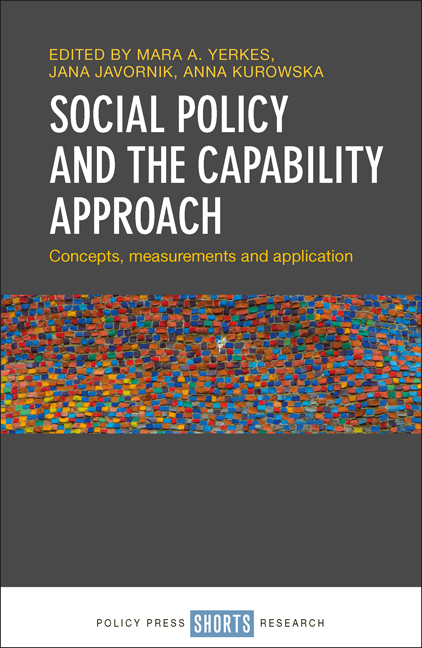Book contents
- Frontmatter
- Contents
- List of figures and tables
- Notes on the editors
- Notes on contributors
- one Rethinking social policy from a capability perspective
- two Education as investment? A comparison of the capability and social investment approaches to education policy
- three From ‘active’ to ‘capable’: a capability framework for policy and practice on ageing and later life
- four Converting shared parental leave into shared parenting: the role of employers and use of litigation by employees in the UK
- five Comparative social policy analysis of parental leave policies through the lens of the capability approach
- six Ask rather than assume: the capability approach in the practitioner setting
- seven Social investment, human rights and capabilities in practice: the case study of family homelessness in Dublin
- eight From the capability approach to capability-based social policy
- Index
seven - Social investment, human rights and capabilities in practice: the case study of family homelessness in Dublin
Published online by Cambridge University Press: 30 April 2022
- Frontmatter
- Contents
- List of figures and tables
- Notes on the editors
- Notes on contributors
- one Rethinking social policy from a capability perspective
- two Education as investment? A comparison of the capability and social investment approaches to education policy
- three From ‘active’ to ‘capable’: a capability framework for policy and practice on ageing and later life
- four Converting shared parental leave into shared parenting: the role of employers and use of litigation by employees in the UK
- five Comparative social policy analysis of parental leave policies through the lens of the capability approach
- six Ask rather than assume: the capability approach in the practitioner setting
- seven Social investment, human rights and capabilities in practice: the case study of family homelessness in Dublin
- eight From the capability approach to capability-based social policy
- Index
Summary
Introduction
Since 2014, Ireland, and particularly Dublin, has experienced a dramatic increase in family homelessness, primarily caused by the severe austerity regime between 2008 and 2013 that effectively halted new social housing construction budgets. Increased private rental sector evictions, due to weak tenant protections and rising rents, also contributed. In Dublin, where 78 per cent of homeless families in Ireland are located, there was a four-fold increase between 2014 and 2017 in the number of homeless families living in emergency accommodation (mainly commercial hotels) from 271 families with 585 children, to 1,115 families with 2,270 children. Families are mainly young, the majority (60%) born in Ireland; 65 per cent are headed by lone parents, predominantly women (Hearne and Murphy, 2017). Homelessness is a societal problem, with those affected by homelessness experiencing a severe form of housing exclusion and inequality. It requires a social policy response because without a secure affordable home people are without the fundamental capability to achieve a range of valued functionings in relation to individual safety and wellbeing, family formation, parenting, education, employment and social relationships.
The principal Irish policy response to this new family homelessness crisis is a recently introduced form of marketised social housing policy, a private rental subsidy, the Housing Assistance Payment (HAP). HAP is a state subsidy paid to private landlords to house low-income tenants who qualify for social housing. This contrasts with traditional social housing provision where the local authority directly provided housing.
In early 2017, in response to growing numbers of homeless families being accommodated temporarily in commercial hotels, a new type of emergency accommodation was introduced, Family Hubs. Based on co-living arrangements, Family Hubs are refurbished buildings converted into shared facility accommodation (in former religious institutions, warehouses and hotels). By July 2018, 18 Family Hubs were operational in Dublin providing emergency accommodation for 465 families. Numbers of families in the Hubs ranged from 12 to 98, with half accommodating more than 25 families.
Our research aims to fill a knowledge gap in the understanding of recent developments in Irish social housing policy, particularly from the end-users’ perspective, relating to the impact of HAP and Family Hubs on the rights and capabilities of homeless families.
- Type
- Chapter
- Information
- Social Policy and the Capability ApproachConcepts, Measurements and Application, pp. 125 - 146Publisher: Bristol University PressPrint publication year: 2019



